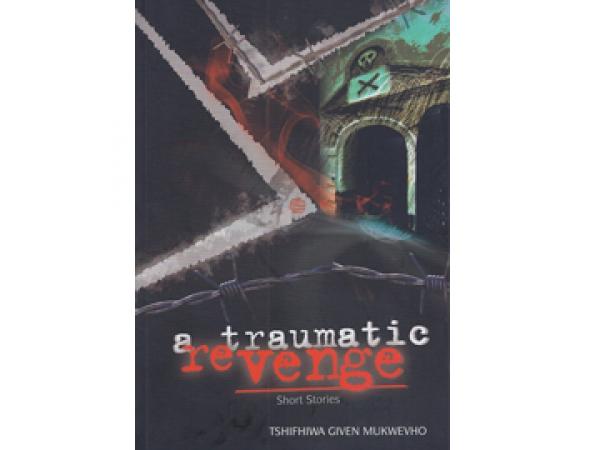A traumatic revenge: an extract from Tshifhiwa Given Mukwevho’s collection of short stories

In the vein of Can Themba’s short stories about Sophiatown, Tshifhiwa Given Mukwevho writes about life in the townships today.
Now in his late 20s, Mukwevho served 11 years in prison (of a 22-year-sentence) for breaking and entry. He was 14 when he was arrested.
And yet it was in Kutama Sinthumule Maximum Security prison that he honed his writing skills and produced a book of short stories – A traumatic revenge.
The stories confront the gritty daily realities of hard living, such as xenophobia, male prostitution, violence and drugs. The title story deals with male rape in prison. These are highly readable, clearly told stories. They are also moral tales with a deep sense of irony and the occasional sardonic twist.
In a story about the tragic consequences of an ill-conceived student protest, Mukwevho writes: “The kind of language we speak has taken my friend”; in another story about xenophobia, the protagonist laments, “Our people. They’ve destroyed us.”
Mukwevho gives an insider’s view, related with just the right amount of moral detachment.
Extract: The moment we bumped from the main road onto the rutted, dusty village one everywhere looked deserted. The air, slipping in through the wound-down windows, felt cool and pleasant. At the end of the first column of fenced yards, we turned left. Right in front of us in the middle of the road, two women were brawling and struggling against each other over a package. When we drew closer we stopped.
“It’s mine!” “No. It’s, is mine!”
“You promised we will share – go half and half?” yelled the other, tugging the package. “What’s up with you?”
“Mm-my!” she shook her head. “You should’ve taken one for yourself.”
“Okay. So you were making a fool of me.”
She pulled the box harder, and the other let her but not without a bolt of a fist across her face. With a pitched cry she loosened her grip on the box, which then fell on the dusty ground with a thud. It was written ‘canned foods’ on the sides. Indeed it looked absurd; two big women, whole mothers, fighting over some tins of beans.
“Ah!” cried Thomas. “Those are the beans we sell in the shop, Mr. Tshiginga?”
I could not as much do more than shaking my head.
“Oh my goodness!” Livhuwani cried as she pushed open the door to get out. “Oh…”
She strode towards them. She had almost got between the two women when I dashed out and seized her by hand and brought her back to the safety of the car. Tensed, we chose to overlook the brawling women and drove off. Turning right, we raced on about thirty metres then got to the shop’s yard.
Alas! The yard was in turmoil. Unevenly torn-off wrapping paper and boxes smiled at the blue sky. There were white tracks on the ground. Small children, boys in shorts with chest bared to the sun and girls dressed in dirty clothes rushed out of the store clutching sweets in their hands. Lollipops lolled from their mouths, and they drooled. We looked out at them in disbelief as they scattered in all directions, running for their dear lives. They easily slipped out of the yard through the looping fencing.
I brought the car to a halt. We got out.
“Hey!” we shouted in unison.
We tried to charge at the children, but in vain. We could not catch up with them. So we turned and ran into the store.
Oh! Squeezed out of place, empty and barren shelves greeted us. The white tracks that showed on the ground were from the heavy 80kg bags of mealie meal being dragged along from the storage, whisked off to the huts of men and women who never worked for it. Livhuwani, broken, jumped over to me. She folded her arms round my cold, sweating body, embracing me. She wept uncontrollably. I felt the pain, the misery of it all, shooting through my body.
“Where are we going to start, Tshiginga?”
Once again, in a split second, the thought of the jigsaw in the sky rang loud on my mind.
“Eiesh,” I sighed, telling the only truth in my mind. “I am equally confused.”
“What are we going to do?” she lamented. “Those of our own have destroyed our faith.”
“No, Livhu,” was all I could say.
And I felt her embrace tightening round my body, as if seeking some solace and assurance: that things would be all right.
A traumatic revenge by Tshifhiwa Given Mukwevho Timbila Publishing ISBN 978-0-9869991-2-3 103 pages
Review by Brent Meersman for GroundUp.
Support independent journalism
Donate using Payfast

Don't miss out on the latest news
We respect your privacy, and promise we won't spam you.
Next: The week in political activism - March 19, 2014
Previous: Misunderstood and villainised: the minibus taxi industry’s real issues with MyCiTi

This article is licensed under a Creative Commons Attribution-NoDerivatives 4.0 International License.
